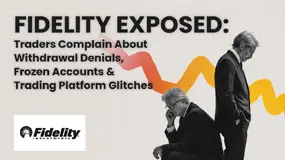简体中文
繁體中文
English
Pусский
日本語
ภาษาไทย
Tiếng Việt
Bahasa Indonesia
Español
हिन्दी
Filippiiniläinen
Français
Deutsch
Português
Türkçe
한국어
العربية
Check Yourself: Are You Always Rushing for Trades?!
Abstract:With market fluctuations happening in real-time and profits hinging on split-second decisions, many traders develop an impulse to act quickly. But have you ever stopped to ask yourself: Am I rushing into trades? If you’re constantly clicking “Buy” or “Sell” in a flurry of excitement or anxiety, you may be falling into a dangerous trap that could cost you more than you realise.

In the fast-paced world of online trading, speed often seems synonymous with success. With market fluctuations happening in real-time and profits hinging on split-second decisions, many traders develop an impulse to act quickly. But have you ever stopped to ask yourself: Am I rushing into trades? If youre constantly clicking “Buy” or “Sell” in a flurry of excitement or anxiety, you may be falling into a dangerous trap that could cost you more than you realise.

The financial markets thrive on volatility, and traders often feel an overwhelming urge to seize every apparent opportunity. This behaviour is commonly fuelled by fear of missing out (FOMO)—the anxiety that a lucrative opportunity is slipping through your fingers. Social media, financial news, and trading forums amplify this pressure, encouraging hasty decision-making.
However, rushing into trades without proper analysis can have dire consequences. Impulse trading often leads to poor risk management, emotional decision-making, and significant financial losses. By constantly reacting instead of planning, you expose yourself to avoidable mistakes, such as buying at peak prices or selling at the worst possible moment.

The most successful traders follow a carefully structured strategy rather than giving in to emotions. If you find yourself making frequent, unplanned trades based on gut instinct, consider these warning signs.
Entering trades without a solid plan is one of the biggest red flags. If you are buying or selling without predefined entry and exit points, you are likely gambling rather than investing. Another telltale sign is frequently checking your portfolio and reacting impulsively. Obsessively watching price movements can lead to unnecessary panic or overconfidence, causing you to make rash decisions that you later regret. Speaking of regret, if you often second-guess your trades soon after placing them, it indicates that your decisions lack proper justification. Additionally, feeling a constant urge to be in the market suggests an unhealthy attachment to trading. Being unable to sit on the sidelines is a sign of overtrading, which can drain both your capital and mental focus.

If any of these signs sound familiar, it is time to recalibrate your approach. The first step towards breaking free from impulsive trading is developing a structured trading plan. By defining clear entry and exit strategies, setting risk limits, and committing to your plan, you eliminate the guesswork and emotional interference that often lead to costly mistakes. Embracing patience is equally important. Not every market movement requires a response, and sometimes, the best trade is the one you do not take.
To safeguard your trades from emotional decisions, use stop-loss and take-profit orders. These tools help ensure that your trades are executed according to pre-set conditions rather than being influenced by momentary market fluctuations. Keeping a trading journal can also be highly beneficial. Recording your trades, along with the reasoning behind them, allows you to identify patterns in your behaviour and pinpoint areas where you may be acting impulsively. Additionally, limiting screen time can help mitigate stress-induced decisions. Constantly monitoring the markets increases anxiety and the likelihood of making knee-jerk reactions, so stepping away and trusting your strategy can lead to better long-term results.
In trading, speed can be an asset, but only when it is backed by careful planning and sound judgment. If you often find yourself rushing into trades, take a step back and reassess your strategy. The best traders are not the ones who trade the most but the ones who trade the smartest with proper planning.
Next time you feel the impulse to execute a trade, ask yourself: Is this a well-thought-out decision, or am I simply chasing the market? The answer could mean the difference between sustainable gains and costly mistakes.

Disclaimer:
The views in this article only represent the author's personal views, and do not constitute investment advice on this platform. This platform does not guarantee the accuracy, completeness and timeliness of the information in the article, and will not be liable for any loss caused by the use of or reliance on the information in the article.
Read more

Man Arrested in Rome Over €50M Forex and Crypto Scam Targeting German Investors
According to the report, an Israeli national has been arrested in Rome in connection with a sprawling €50 million forex and cryptocurrency investment scam that allegedly defrauded hundreds of investors across Europe, including victims in Germany, Austria, and Switzerland.

Polymarket Onboards First US Users Since 2022 Shutdown: Beta Relaunch Signals Major Comeback
Crypto-based prediction platform Polymarket has officially begun onboarding select U.S. users for real-money betting, marking its first return to the American market since a regulatory shutdown in 2022.

WikiEXPO Global Expert Interviews: Gustavo Antonio Montero: ESG in Finance
As WikiEXPO Dubai concludes successfully, we had the pleasure of interviewing MR. Gustavo, the Chairman and Founder of Carter Capital Management. (Sustainable Digital Assets Management) and Palmer Advisory and Consulting. Palmer is a global business that develops advanced fintech/digital technology solutions and works with Blockchain technologies.

Fidelity Exposed: Traders Complain About Withdrawal Denials, Frozen Accounts & Platform Glitches
Does Fidelity Investments prevent you from accessing funds despite numerous assurances on your requests? Do you witness an account freeze by the US-based forex broker every time you request withdrawal access? Do you struggle with an unstable trading platform here? Is the slow Fidelity customer service making you face forced liquidation? These issues haunt traders, with many of them voicing their frustration on several broker review platforms such as WikiFX. In this Fidelity review article, we have shared quite a few complaints for you to look at. Read on!
WikiFX Broker
Latest News
Consob Targets Political Deepfake “Clone Sites” and Unlicensed Platforms in Latest Enforcement Round
WikiEXPO Global Expert Interviews: Gustavo Antonio Montero: ESG in Finance
2 Malaysians Arrested in $1 Million Gold Scam Impersonating Singapore Officials
Is FXPesa Regulated? Real User Reviews & Regulation Check
Fraud Mastermind Zhimin Qian Sentenced to 11 Years for $6.6 Billion Bitcoin Ponzi Scheme
Almahfaza Broker – 2025 Review: Safe or Scam?
Uniglobe Markets Review 2025: A Complete Guide to an Unregulated Broker
INZO Broker No Deposit Bonus: A 2025 Deep Dive into Its Offers and Risks
Exness Broker Expands in South Africa with Cape Town Hub
Global Guide to Finding Forex IBs/Brokers — Share Your Pick and Win Big!
Currency Calculator



